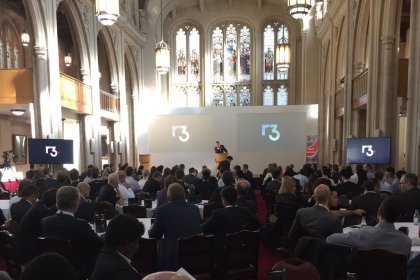According to the consortium, a new blockchain-based solution will enable fast and efficient international transactions among financial organizations.
Enterprise software company R3 CEV together with 22 of its member banks have developed a new platform to enable quick and cost-effective cross-border payments. The prototype of the platform is slated to be released by the end of 2017.
Currently, the process of conducting international transactions takes several days to complete, which increases the risk of fraud and costs businesses millions annually. With the new solution, banks and other financial companies will be able to execute payments almost instantly, thus improving global trade.
The platform is based on Corda, a distributed ledger technology that is a result of more than two years of intense research and development by R3 and its members. The group was created for facilitating the management of financial agreements between regulated financial institutions. Last year, the platform became available for developers who can now use the source code.
R3 CEV has recently introduced 1.0 version of Corda system and achieved API stability for the first time ever, which means that developers can build apps upon the platform without changing the core API.
The newly developed platform will sustain digitized versions of fiat currencies on a decentralized ledger and will also work with central bank-developed digital currencies in the future.
“International payments systems have struggled to keep pace with the explosion of global trade and the globalisation of the world’s markets,” said David E. Rutter, CEO of R3.
“This marks a significant milestone for distributed ledger technology as we work alongside our bank members to harness its unique attributes to build the world’s first true international payments system. This solution will be a game-changer for any bank or company whose business relies on making or receiving cross-order payments, and is a key part of R3’s wider strategy to leverage distributed ledger technology for faster and more efficient execution of all types of financial transaction.”
R3 CEV now works with over 100 banks, financial institutions, regulators, trade associations, professional services companies. Among the banks involved in the project are Barclays, BBVA, CIBC, Commerzbank, DNB, HSBC, Intesa, KBC, KB Kookmin Bank, KEB Hana Bank, Natixis, Shinhan Bank, TD Bank, U.S. Bank and Woori Bank.
“Natixis believes in the potential of distributed ledger technology for cross-border payments and is exploring several initiatives in that space,” said Frederic Dalibard, Head of Digital for Corporate & Investment Banking at Natixis.
“In our view, R3’s proposal is very promising, because it is built on the right approach, relies on Corda, and sets the project on a path which is relevant – notably by anticipating right out of the gate how the proposed architecture could be adapted when central bank digital currencies appear.”
Earlier this year, the group announced plans to raise $105 million during a third funding round from existing members and strategic investors. The company has already attracted the investment of total $107 million.
next